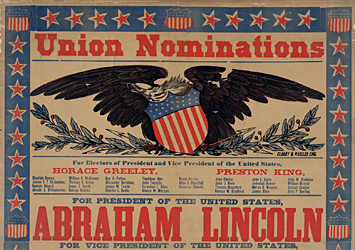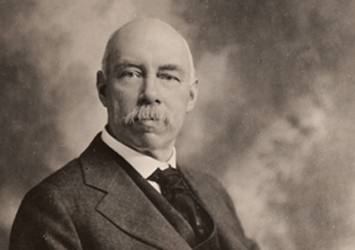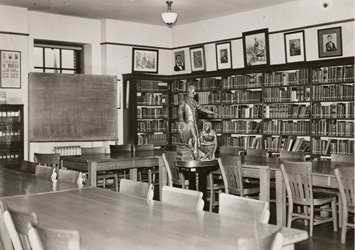Introduction

Union Nominations…for President of the United States, Abraham Lincoln
[.] for Vice President of the United States, Andrew Johnson.
New York, 1864. Poster.
Houghton Library celebrated the bicentennial of Abraham Lincoln’s birth with Harvard’s Lincoln, an exhibition featuring selections from its extensive Lincoln collection. Harvard College Library’s rich holdings devoted to Abraham Lincoln, which now reside in Houghton, were built primarily by two significant donations in the early decades of the twentieth century: the Alonzo Rothschild collection in 1916 and the William Whiting Nolen bequest in 1924.
Alonzo Rothschild (1862-1915), born in New York City to German-Jewish parents, developed early in life an interest in books and reading. As a young man, Rothschild tried his hand at journalism, spending several months working as a reporter for the New York Commercial Advertiser. Employment with a wholesale jewelry company interrupted for several years his plans for a journalistic career. However, it was through the jewelry business that Rothschild returned to journalism, when in 1885 he founded The Jeweler’s Weekly, a publication devoted to covering news of the trade with minimal advertising. The publication was immensely successful and, as a result, Rothschild was able to retire at the young age of twenty-eight. Rothschild devoted the remainder of his life to self-education and to writing. He moved from New York City to Cambridge, Massachusetts, and attended courses at Harvard as a special student. It was during his residency in Cambridge that Rothschild developed an interest in studying the life of Abraham Lincoln. Rothschild planned to write a book or two on Lincoln and his cabinet. As his research progressed, however, Rothschild decided to concentrate solely on Lincoln, producing Lincoln, Master of Men: A Study in Character, published by Houghton Mifflin’s Riverside Press in 1906. Rothschild was writing a second book on Lincoln when his life was tragically cut short by a swimming accident in 1915. Two years later “Honest Abe”: A Study in Integrity was published through the efforts of his son John.

Alonzo Rothschild. From Rothschild’s posthumous work, “Honest Abe”:
A Study in Integrity (Boston, 1917).
In the course of research for his books on Lincoln, Rothschild assembled an extensive working library devoted to his hero. Comprising 1,000 volumes, including virtually all of the standard biographical studies of Lincoln published up that time, 1,300 pamphlets, a remarkable assortment of magazine articles, and files of newspaper clippings on various aspects of Lincoln’s life, Rothschild’s collection was donated to Harvard College Library in 1916 by his widow as a memorial to her late husband. In 1920, four years after its arrival at Harvard, the Rothschild collection was placed in Widener Library’s History Department room (Widener K).
The Rothschild donation was augmented in 1924 by the William Whiting Nolen bequest. Born in Philadelphia, Nolen (1860-1923) entered Harvard in the fall of 1880, graduating summa cum laude in 1884. For two years following his graduation, Nolen served as an assistant in biology at Harvard, securing his master’s degree in 1886, and then attended Harvard Law School from 1889 to 1891. He did not complete his legal studies, but instead became a private tutor, establishing his own school in Harvard Square. Assisting enrolled students as well as those who wished to enter Harvard, Nolen’s school, neither affiliated with nor authorized by the university, became both popular and prosperous. Located for many years on Massachusetts Avenue close to Harvard Yard, first in Manter Hall and later in Little Hall (both buildings were later demolished and replaced by Holyoke Center), the school was equipped with laboratory space and living space for a small number of students. By the time of Nolen’s death on 5 June 1923, the school was employing about fifty part-time teachers and instructing more than four hundred students annually.

William Whiting Nolen. Photograph, source and date unknown. HUG 300,
Nolen, William Whiting, Harvard University Archives. Reproduction
courtesy of the Harvard University Archives.
Nolen, who never married, devoted his life to his school and to his students. As a result of the success of his school, Nolen became a wealthy man. While Nolen put much of the money he made back into the school, he also used it to assemble a large private library, purchase antiques, and build an extensive collection of Lincolniana. Nolen’s devotion to his school is exemplified by the fact that he refused to let ill health prevent him from carrying on with his teaching duties. Despite being bedridden with a heart condition, Nolen continued to teach up until hours of his death.
The Lincoln collection Nolen bequeathed to Harvard College Library includes 1,000 volumes, close to 4,000 pamphlets, and a large assemblage of manuscript letters, broadsides, sheet music, portraits, prints, medals, badges, and sculpture. According to Nolen’s will, his bequest was to be kept as a separate collection and exhibit under the name of “The William Whiting Nolen Collection of Lincolniana.” The Nolen collection was installed in the History Department or Room K, located on the top floor of Widener Library, side by side with the Rothschild collection. In recognition of its extensive Lincoln collection and its value to students and faculty, the library renamed Room K the Lincoln Room. By the mid-1920s, Harvard College Library, with its Lincoln Room filled with books, pamphlets, prints, broadsides, statuary, and works of art, together with its extensive general collections relating to Lincoln and the Civil War, had become a leading repository of Lincolniana.
Alonzo Rothschild and William Whiting Nolen were actively building their collections during a period when it seemed like almost everyone was collecting Lincoln. Of course, Lincoln collecting did not cease with the passing of Rothschild’s and Nolen’s generation. It continued to be – and is today – a vibrant and highly competitive field. Lincoln scholars owe an enormous debt to collectors, past and present, and to the institutional collections they have created and enhanced. This is especially true in the aftermath of the bicentennial year of Lincoln’s birth. As students and scholars examine and re-examine the life of the nation’s sixteenth president, they will require access to primary resources that reside in various institutional repositories, including Houghton Library.

Lincoln Room (Widener Library). Photograph, source and date unknown.
HUV 49 (Folder 10), Harvard University Archives. Reproduction courtesy
of the Harvard University Archives.
The exhibition Harvard’s Lincoln presents a selection of materials from Houghton Library’s collection of Lincolniana that is astonishing in breadth as well as diversity. The exhibition includes several recent acquisitions as well as books, manuscripts, and artifacts from the collection of William Whiting Nolen. Houghton’s Lincoln collection has been assembled in a fashion very much in keeping with the library’s tradition: through a combination of years of assiduous and visionary collecting and the benevolence of interested and knowledgeable donors. The purpose of the exhibit is threefold: to commemorate the Lincoln bicentennial and to promote Houghton Library’s relevant collections; to assert the library’s commitment to meeting the needs of its users, especially Harvard’s faculty and students; and, finally, to pay tribute to Alonzo Rothschild and William Whiting Nolen, two donors whose generosity built the foundation on which Houghton’s Lincoln collection rests. It is to them that Harvard’s Lincoln is dedicated.
Curator
Thomas A. Horrocks, Ph.D. Associate Librarian of Houghton Library for Collections
| Houghton Library, Harvard College Library | The Lehrman Institute |
Houghton Library, Harvard College Library |
|
Peter X. Accardo |
Dennis C. Marnon |

